
Hello Sir,
I’ve heard of this question that I would like your answer on. “You are a First Officer in a cockpit with a Captain flying on an Airbus. Suddenly, an alarm blares and warns that the plane is heading onto a collision course, however the Captain refuses to acknowledge the warning and tells you that the equipment on board is faulty.
As a First Officer, what would you do? Defy the authority of the Captain or risk an accident?”
I look forward to your response.
Cheers,
Calvin.
Hi Calvin,
In the airlines, we teach pilots to fly safely by attending a course known as Crew Resource Management (CRM). Among the topics taught is Assertive Support Process under Communication. Here we train first officers to be assertive and speak up if he observes the captain is doing something dangerous.
You can read what I have written in my first book LIFE IN THE SKIES below:
“Speaking Up Saves Lives
Good men and women are trained to say no to the boss
There’s no room in the cockpit for ‘yes-men’ among pilots. When lives are at stake, co-pilots are trained to speak up and even wrest control to land the aircraft safely.
The old belief among co-pilots was that the captain could do no wrong. First Officers had no choice but to adhere to the chain of command. But what if the captain makes a serious mistake? Can his error be allowed in the face of dire consequences?
From some air accidents in the past, it would appear that certain co-pilots faced difficulties in challenging their captains. This reluctance to question authority might have been brought forward from the past, when senior captains were ex-military pilots and their commands were not to be questioned. There is also an East Asian culture of deference to the wisdom of an older person. The captain was ‘God’, someone not to be argued with even if the wrong decision was made.
In terms of civil aviation, this is no longer valid where safety is concerned. More than 75 per cent of air crashes involve human error, which can be attributed to failures of leadership, team coordination and decision-making. Constant and rigorous training in Crew Resources Management (CRM) is among some of the steps that have been put in place to mitigate against these possibilities.”
In my second book, Sky Tales, due to come into the market around August 2017, I have further written more on this topic. Here is a sneak preview:
“Today, co-pilot training is focused on enhancing flight safety in flight. First officers are trained to be assertive when conveying critical messages. The strategy is for them to first alert the captain of any impending danger, then offer a solution. If no corrective action is taken by the captain, the co-pilot can resort to an emergency assertive procedure, which would normally be initiated when the plane is less than 1,000 feet above ground level.
For example, if a co-pilot determines that a landing should be aborted owing to unsafe conditions, he must communicate this clearly to the captain. If the latter ignores the warning and fails to take the necessary remedial action, the co-pilot’s next address would be, “Captain, you must listen, go around now!” If this also fails, he must seize the controls and state, “I have control, going around now!”
This special procedure is imperative in the aviation industry as, in an emergency; there is no time to argue over critical decisions. Any disagreement between the captain and the first officer will be resolved later on. Assertive action by the co-pilot in an emergency is sanctioned by airline management.”
To answer your question, this process can be applied even if the dangers are encountered at any phase of the flight, not necessary below 1000 feet.